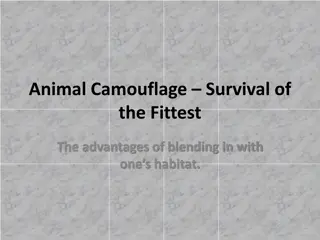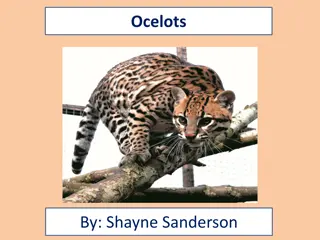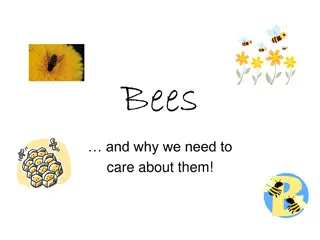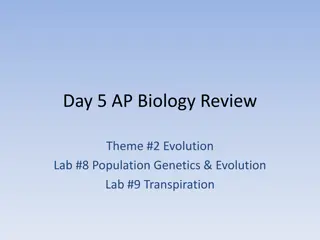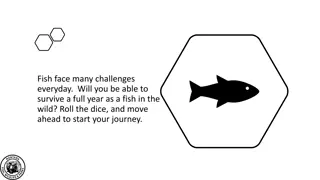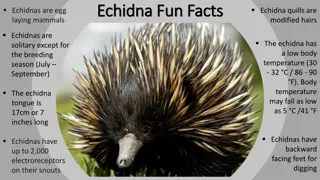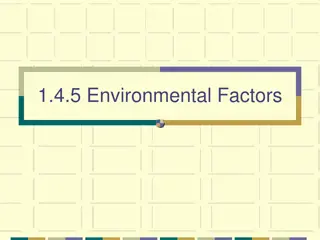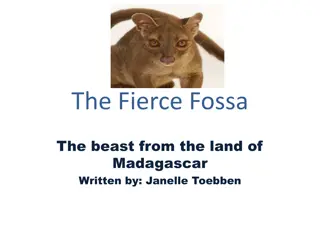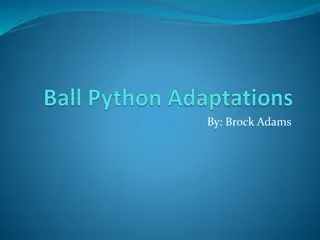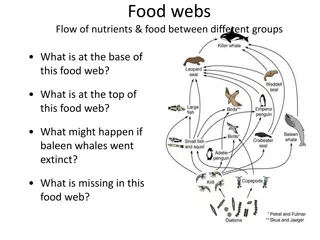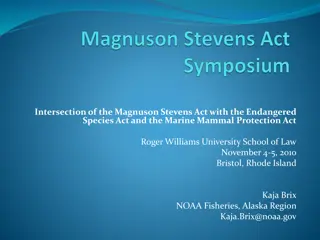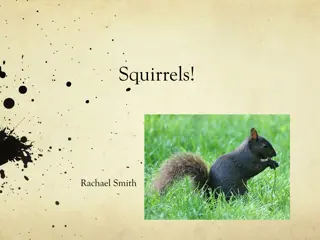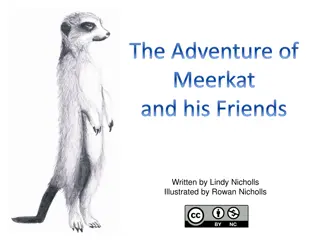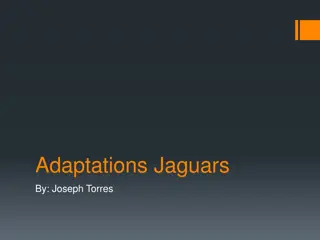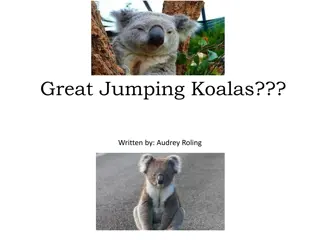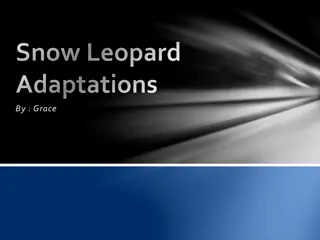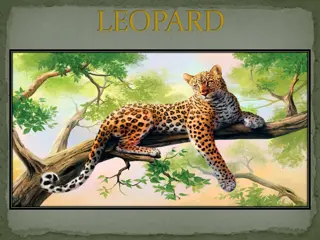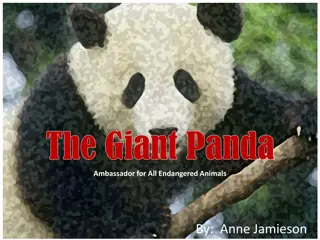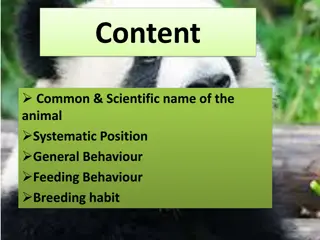Understanding Animal Camouflage and its Importance in Survival
Animal camouflage plays a crucial role in survival by allowing prey to blend in with their habitats to avoid predators, and enabling predators to effectively hunt for food. This natural adaptation enhances the chances of both prey and predators in the wild.
3 views • 46 slides
Fascinating Insights into Hammerhead Sharks
Hammerhead sharks, known for their unique hammer-shaped heads, are carnivorous creatures that primarily feed on fish, stingrays, and other sharks. They are swift swimmers, capable of outpacing many other shark species. These creatures inhabit various seas worldwide and have interesting interactions
0 views • 6 slides
Discovering Ocelots: A Closer Look at These Fascinating Wild Cats
Ocelots, with their distinctive coat and carnivorous diet, lead an intriguing life. They inhabit various regions, from rain forests to South American forests, showcasing their superb climbing skills. The ocelots' life cycle, including the birth of kittens and their solitary adulthood, further adds t
0 views • 6 slides
Insights into the Deadly Yellow Spotted Lizard
Delve into the mysterious world of the Yellow Spotted Lizard, a venomous creature known for its lethal defense mechanisms. From its appearance to habitat, learn about predators, and understand why encountering this lizard is a risky affair. Uncover the unique features of this reptile as you explore
0 views • 29 slides
Importance of Bees: Why We Need to Care About Them
Bees are essential pollinators, with various species playing crucial roles in ecosystems. They forage for pollen and nectar, create honey, and live in diverse habitats. Bumble bees, honey bees, and solitary bees each have unique characteristics and contribute to biodiversity. However, bees face thre
6 views • 21 slides
Understanding Child Grooming: Recognizing and Preventing Abuse
Child grooming is a manipulative process used by predators to gain a child's trust and prepare them for sexual abuse. Predators often create multiple identities to appear positive to young people. It is crucial to be cautious online, report any suspected grooming, and seek help from trusted adults o
1 views • 4 slides
Exploring Evolution and Population Genetics in AP Biology
Delve into the fascinating world of evolution and population genetics with themes covering natural selection, genetic equilibrium, allele frequencies, and more. Understand how molecular and cellular events shape emergent properties at individual and population levels. Explore the impact of factors l
0 views • 12 slides
Surviving the Wild: A Fish's Journey Full of Challenges
Enter the wild as a fish, facing various obstacles such as parasites, predators, and human interference. Roll the dice and navigate through different scenarios where your fate hangs on the outcome. Learn interesting fish facts along the way as you strive to survive for a full year in the unpredictab
1 views • 20 slides
Online Safety and Social Media Guidelines for Students
Langford Middle School Classroom Guidance session in February 2020 focused on Internet safety and responsible use of Social Media. Students were encouraged to watch a video and engage in discussions on being safe online. Key topics included online interactions, identifying predators, and protecting
0 views • 16 slides
Fascinating Facts About Echidnas - Quirks of Egg-Laying Mammals
Echidnas, intriguing egg-laying mammals, have unique traits like quill-covered bodies, backward-facing feet, and a long tongue for catching ants and termites. They are solitary except during breeding season and are known for their low body temperature. Learn more about these fascinating creatures!
0 views • 4 slides
Understanding Environmental Factors in Terrestrial and Aquatic Environments
Environmental factors play a crucial role in shaping ecosystems. In both terrestrial (land) and aquatic (water) environments, organisms are influenced by abiotic factors such as temperature, light intensity, and pH, as well as biotic factors like plants, predators, and competitors. Understanding the
4 views • 19 slides
Discover the Fascinating World of the Fierce Fossa
Delve into the realm of the Fierce Fossa from Madagascar through this insightful report by Janelle Toebben. Learn about its appearance, behaviors, sounds, predators, and survival strategies. Explore the nocturnal habits, unique features, and challenges faced by this intriguing mammal.
0 views • 14 slides
Analysing Dickens' Portrayal of Scrooge in "A Christmas Carol
Dickens vividly characterizes Scrooge as a miserly, cold-hearted individual through striking similes, emphasizing his lonely and secretive nature. By comparing him to an oyster, Dickens highlights Scrooge's solitary and unsociable demeanor, shedding light on the deeper themes of the story.
0 views • 10 slides
Understanding Ball Pythons: Fascinating Facts and Behaviors
Ball pythons, known for their heat pits and night vision, have fascinating adaptations for hunting and survival in the wild. They use camouflage to hide from predators, roll into a ball when scared, and have unique eye placement for 360-degree vision. These snakes thrive in savannah and thorn scrub
2 views • 8 slides
Sustainable Practices for Protecting Earthworms in Vermiculture Beds
Implementing preventive measures like covering the vermibed with wire mesh, gunny bags, etc., and using neem-based insecticides can safeguard earthworms from predators like birds, ants, rats, and diseases. Following agricultural practices and maintaining favorable environmental conditions are crucia
0 views • 5 slides
Learn about the Dingo: The Beast of the Ground by Lucas Hayes McMahan
Discover the fascinating world of the Dingo in its natural habitat. This report covers their physical characteristics, diet, predators, survival adaptations, and more. From their unique appearance to hunting techniques and protective behaviors, explore the intriguing life of the Dingo.
0 views • 10 slides
Analysis of "The Solitary Reaper" by Wordsworth
A lyrical ballad by Wordsworth, "The Solitary Reaper" captures the scene of a Highland girl singing and reaping in a field. The speaker, mesmerized by her melancholy song, speculates on its meaning, ultimately realizing that the beauty of her voice is what truly moves him. The poem evokes themes of
0 views • 5 slides
Understanding Food Webs and Trophic Levels in Ecosystems
Food webs illustrate the flow of nutrients and energy between different organisms in an ecosystem. At the base of a food web are the primary producers, while predators occupy the top. If baleen whales were to go extinct, it could disrupt the balance of their ecosystem. Biomass decreases as energy is
0 views • 11 slides
Ecosystem Considerations in Fisheries Management Laws
Analysis of the intersection of the Magnuson Stevens Act, Endangered Species Act, and Marine Mammal Protection Act in addressing ecosystem considerations within fisheries management. Evaluation of current regulatory frameworks and the need for an ecosystem-based approach towards fisheries and apex p
0 views • 15 slides
The Bet - Anton Chekhov's Story of Solitude and Redemption
In Anton Chekhov's short story "The Bet," a banker and a lawyer make a bet on whether the lawyer can endure fifteen years of solitary confinement. As the lawyer immerses himself in learning and self-discovery during his isolation, he ultimately renounces the bet, realizing the fleeting nature of mat
0 views • 11 slides
Fascinating World of Squirrels: Facts and Insights
Squirrels, with their diverse species and habitats, play a vital role in ecosystems. They are omnivores, living in trees, underground burrows, or old logs. Predators like wolves and humans threaten them, but their agility helps in survival. Discover more about these charming rodents and their intera
0 views • 13 slides
The Adventure of Meerkat and His Friends
Meerkat, feeling lonely in his large clan, decides to embark on an adventure with his friends Ground Squirrel and Mongoose. As they journey through the African desert, they face challenges like avoiding predators and finding shelter. Will they succeed in their quest for a new adventure? Join them in
0 views • 12 slides
Fascinating Facts about Jaguars
Jaguars are powerful predators with a diverse diet, inhabiting a range of habitats from South America to Arizona. Their distinctive characteristics make them a remarkable species with various adaptations for survival.
0 views • 6 slides
Discovering the Fascinating World of Jumping Koalas
Join us on an exciting journey to uncover the hidden secrets of jumping koalas. From their unique appearance to their survival tactics, this report delves into every aspect of these adorable creatures, making them your new favorite animal. Learn about their physical characteristics, movements, diet,
4 views • 10 slides
Understanding Dramatic Monologue in Poetry through "Havisham
Dramatic monologue in poetry is a form where a solitary speaker addresses an audience, offering insight into a character's thoughts and emotions. This exploration often reveals complexities, conflicting viewpoints, and hidden truths. Through examining the character of Miss Havisham from Charles Dick
1 views • 43 slides
Snow Leopard - Amazing Adaptations and Behavior
Discover the fascinating world of snow leopards, known for their yellowish and grayish coat that provides camouflage in their mountainous habitat. With a population ranging from 3,500 to 7,000 in the wild, these majestic creatures exhibit unique characteristics such as a two-feet-tall stature and th
0 views • 6 slides
The Fascinating World of Leopards
Leopards, with their well-camouflaged fur and adaptable nature, thrive in the wild. They are solitary predators known for their opportunistic hunting behavior, broad diet, and ability to move heavy prey into trees. Unlike lions, leopards do not live in groups, and adult males live separately from fe
0 views • 8 slides
Understanding Children's Play Development: Connecting Nature and Environment
Outdoor play connects children, both typical and atypical, to nature and their surroundings, fostering cognitive skills and imaginative play. Piaget and Vygotsky emphasized the importance of symbolic thought in play, leading to language development and diversification of skills like expression, inde
0 views • 15 slides
The Importance of Secret Prayer in the Life of Jesus
Discover how Jesus emphasized the significance of secret prayer through instances from the Scriptures where He retreated to solitary places for intimate communion with the Father. These moments of seclusion enabled Him to deepen His relationship with God, teaching us the value of private prayer for
0 views • 26 slides
Supporting Solitary Families with the WANA App
Last year saw a rise in single-member families in Albania and beyond. Nearly 6000 households have a sole member. To address their needs, the WANA App (We Are Not Alone) integrates a mobile app with a smart bracelet equipped with sensors. Features include emergency call, login-register functions, and
0 views • 11 slides
Understanding Thomas Hobbes' Leviathan: State of Nature, Natural Laws, and Commonwealth
Thomas Hobbes explores the state of nature, natural laws, and the formation of the commonwealth in his work Leviathan. He discusses the equality of men, causes of conflict in the state of nature, and the transition out of this chaotic state towards civil society under a monarchy. According to Hobbes
0 views • 15 slides
The Giant Panda: Ambassador for Endangered Animals
The Giant Panda is a symbol of conservation efforts, with distinctive black and white fur. They primarily eat bamboo and are known for their solitary nature. Despite their bear classification, they do not hibernate and can adapt to various elevations. Learn more about their behavior, diet, and uniqu
1 views • 7 slides
Giant Panda - Overview of Behavior, Feeding, and Breeding Habits
The Giant Panda, scientifically known as Ailuropoda melanoleuca, is a unique animal belonging to the Carnivora order. They exhibit solitary behavior but communicate through various means. Despite being classified as carnivores, they primarily feed on bamboo shoots. Breeding habits include mating bet
0 views • 9 slides
Understanding Dangers to Animals: Predators and Habitat Loss
Animals face various dangers in their natural habitats, including predators and habitat loss. Predators like owls, bobcats, and racoons hunt other animals, while habitat loss, such as the melting Arctic ice cap, threatens species like polar bears. Human activities, like beach development, also impac
0 views • 19 slides
Understanding Retrogressive Metamorphosis in Ascidian Tadpole
Ascidians, also known as sea squirts, exhibit retrogressive metamorphosis where the larval stage possesses advanced features lost in adulthood. With a tough outer tunic, these marine filter feeders have three main types - solitary, social, and compound ascidians. They feed by taking in water through
0 views • 14 slides
Restorative Problem-Solving: An Alternative Approach to Prison Discipline
Research by Michelle Butler from Queen's University Belfast explores the impact of restorative problem-solving as an alternative to traditional prison disciplinary processes in the UK. The study delves into the perceived fairness of adjudications, concerns about solitary confinement for mentally ill
0 views • 12 slides
Understanding Different Types of Child Play Behavior
Explore the various stages of play behavior in children, from unoccupied and onlooker behavior to solitary, parallel, associative, and cooperative play. Learn how children interact with toys and each other at different developmental stages, shaping their social skills and creativity. Discover the di
0 views • 12 slides
Comparative Perspectives on Sentencing and Rehabilitation in Criminal Justice Systems
Exploring the historical context and current practices in sentencing and rehabilitation within criminal justice systems, the discussion covers topics such as the evolving forms of sentencing in the US, the impact of drug sentencing in Portugal, disparities in punishment among different countries, pr
0 views • 11 slides
